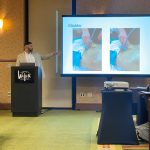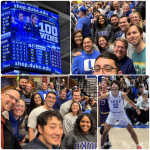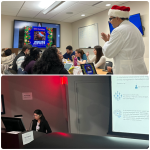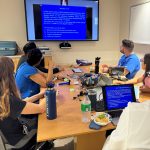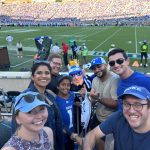Monolith’s Survival Guide
Basics
- Night float is in house. We expect that night float will see all patients so when the teams arrive in the morning they can focus on patients on their teams.
- The Nephrology Call Room is located on the 8th floor of the Duke North hospital room 8217
- Contact Environmental Services if any housekeeping is needed 919-681-9700
- Night float starts at 5 pm and ends at 7 am the next day
- On Saturday, night float comes in at 7pm
- Night float is off on Wed and Sunday
- Sign onto the SPIN pager by calling 970-7746, press *, #, 1, 5, 1, and then your pager number.
- Fellows who have patients on CRRT or patients with active management of something like a DDAVP clamp in ICUs should give verbal sign-out on these patients to the night float at 5pm. You may be called for adjustments in the replacement fluid, potassium, and citrate. You should familiarize yourself with CRRT protocols/orders if called overnight by ICU nursing so that you can answer questions appropriately.
When to call the attending
- Typically all consults should be discussed with the attending with the exception of a routine dialysis patient who just needs maintenance HD the next day.
- The attending is there for your back up and wants to know about any clinical question or difficult decision.
- You should call the attending anytime you are called to see a patient in any ICU.
- You should also call if you are contemplating starting dialysis on any patients (either doing it or decided with the help if an attending to defer).
- All suspected poisonings or toxic ingestions should be called.
- Any admission for PD or HHD.
- The biggest error would be to not call the attending when you should have.
- Talk to an upper level fellow or chief fellow if you have any questions.
- Call the Transplant Attending for any transplant consults
- Call the VA Attending for any VA consults
- Call the Duke attending for Duke consults minus transplant
What to expect when on night float
- Acute Kidney Injury/Electrolyte Disturbances: Typically the question relates more to management rather than diagnosis overnight. You may get called about managing hyperkalemia, acidosis, or asked whether acute dialysis is indicated or not. See all of these consults as they are asking for your help. Make sure they obtain a urinalysis, urine electrolytes, and you should typically obtain a fresh urine specimen (from Foley tube, not the bag!) and examine the sediment under the microscope. Whether you think HD is indicated or not, you should call the attending about this type of consult.
- Maintenance Dialysis: You may get called about a routine hemodialysis patient who will need dialysis the next day. After hours you cannot call their unit to get the HD orders, but you can do most of the work needed to take care of them. At Duke, all dialysis patients need a signed consent on the chart, so please obtain this on all new consults and give to dialysis charge nurse. At the VA, consents for HD are good for 1 year only, and you should update in CPRS if needed.
- Calls from PACU/OR: We sometimes get calls about maintenance dialysis patients while they are still in the OR or recovering in PACU. Obviously, this limits how much can be accomplished. Even in the PACU, we have been advised not to obtain consent here since technically they are coming out of general anesthesia. We have lately been asking the
teams to call when the patient is in a room or have them call first thing in the morning. At best, you could add the patient to the list for HD the next day to help the charge nurse with scheduling and then see the patient first thing in am. - ER Consults: Consults from the ER are technically emergencies. We encourage them to defer to the admitting service on the timing of a renal consult, but if the ED calls then they are likely asking the question “does this patient need HD or some other intervention right now?” If they do need HD urgently, then they need disposition to an ICU or general medicine. We cannot dialyze patients in the dialysis unit if they are hemodynamically unstable, severe acid/base/electrolyte abnormalities, nor have severe respiratory issues. If you would feel uncomfortable admitting to a standard general medicine bed, then you should feel uncomfortable bringing them to dialysis unit. Of note: at the VA, ALL acute hemodialysis at night must occur in an ICU.
- Kidney Transplantation: The fellow is part of the team called in to evaluate patients prior to renal transplantation. The evaluation occurs while waiting on labs and the donor cross match prior to proceeding with the surgery. Your job is 1) screen the patient for any new major illnesses and 2) evaluate for HD needs prior to surgery. As you interview the patient, screen for active infections or symptoms that would suggest new cardiac disease. Review the patient’s labs and EKG for any new abnormalities. The decision to hold the transplant would be a major decision and obviously you would discuss this with the attending on call and also talk to the transplant team as well. Fortunately, this is rarely the case. Also, you may need to perform HD prior to surgery (for example, with isolated hyperkalemia, volume overload). Obtain consent for HD and write orders and you would need to discuss this with the attending as well since it will be happening after hours. We routinely obtain consent for HD as some patients have delayed graft function and may need HD post-op for a few days as well. You receive the call for incoming transplants at the same time as the patient. It is not uncommon for the patient to need to travel anywhere between 1-4 hours. Our advice: find out the destination (either Pre-Op holding or Short Stay 9th floor, the coordinator who calls you can tell you this) and call that unit to have the assigned nurse to page you when the patient has arrived. Ideally, you want to get there after they have checked in and labs have been drawn; so that, by the time you are done seeing them, the labs are back. Then you can make your recommendation for hemodialysis or to proceed with surgery.
- Peritoneal Dialysis Patients: You may get called about maintenance PD or for patient with possible peritonitis. For maintenance PD, you will need to see them, obtain consent, and write orders for PD to commence that evening as most PD patients are on an overnight cycler (CCPD). The patient usually knows their prescription so you can use that for the orders and amend it based on clinical need. For a patient with possible PD related peritonitis. Call the HD nurse on call to obtain fluid and send it for Cell count, manual differential, bacterial and fungal culture. Typically >100 nucleated cells with >50% PMN’s is consistent with PD peritonitis. Remember, dialysis nurses are the only ones that should touch the dialysis catheters. Also, please remember to wear a mask and gloves when evaluating the PD catheter site under the sterile dressing.
- Phone Calls: Any patient or physician can call Duke paging operator and ask to speak with the nephrologist on call. Your job will be to determine the acuity of the call. Acute or potentially serious calls, (i.e. dialysis patient with shortness of breath or transplant patientwith fever) send to local ER. Non-acute (i.e. med refills) refer patient to PMD or e-mail appropriate Duke Nephrologists as indicated.
- Dialysis Outpatients: We frequently have ESKD outpatients coming through the Duke HD unit post-procedure. For instance some will have fistula lysis then dialysis and then go home. It is not uncommon for the outpatients to have had a permcath placed and end up in our HD unit as well. The cross-cover for these patients goes to the SPIN pager, so be aware. The RN’s will have to notify you for various things: i.e. patient wants to sign off early etc. Also any catheter related problem: bleeding, catheter malfunction, we usually try to notify VIR as soon as possible since they are usually quite responsive and will come intervene.
Tips for Night Float
- Who to call at night: For Duke consults, this will be the assigned Duke Attending on call. For the VA, this will be the VA attending on service for the week (see the Schedule attached to this). Use QGenda.
Handoff the Day after Call
- E-mail all the fellows and attendings the next morning with the new consults before 7am. Use QGenda to find out who this is. Include the Chief fellow and Dr. Sparks on each sign out.
- Make sure to label the email as a SECURE message (provides encryption). Also for any VA consult you saw, add the on call VA attending and VA fellow as co-signers to your note. In your email, avoid using any personal identifiers for the VA consult (the VA doesn’t endorse our encryption apparently) and just say “male in MICU I added you as co-signer”).
- Consult Allocation when you are post-call (yes it can be confusing) use QGenda
- Transplant Fellow: ANY kidney transplant patient in the hospital.
- Acute Fellow: any ICU consult.
- Floor Fellow: all non ICU consults that are NOT known ESKD. All patients on PD go to the FLOOR service.
- Maintenance Fellow: Any known patient on dialysis except PD and patients with a functioning transplant on a regular floor and not in an ICU.
- VA Fellow: Any consult at the VA.






